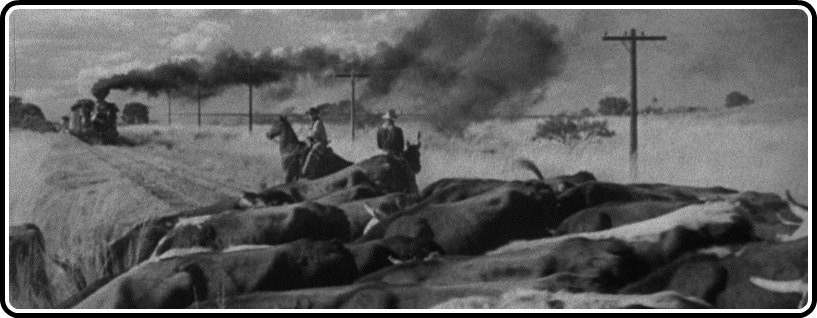
It is incredibly refreshing that a director like Howard Hawks can continue to surprise and delight me. Hawks was my gateway drug to classic cinema. It stands to reason that I might very well have dove into such films without a key viewing of The Big Sleep a little more than ten years ago, but I guess we’ll never know. Sitting in Portland’s Cinema 21 one hot August night, I was opened up to a whole art form that was discursive, irreverent, totally indifferent to plot, and funny as hell. All this time later, I still don’t have Hawks totally figured out, but he never ceases to catch me completely off guard, as little details I’d previously not noticed or completely ignored now seem revelatory and essential. Such is certainly the story with his 1948 Western, Red River.
One of Hawks’ most expensive features to date, Red River follows a group of men as they attempt to drive over ten thousand cattle from South Texas to Missouri, a three-month journey that will cost the men more than their time and money, but a few lives and, in some ways, their very humanity. Tom Dunson (John Wayne), having incurred all of the costs of the endeavor, from raising the cattle to financing the trip, will not deter from the path he has set forth, despite harsh conditions getting a good deal harsher and some vague rumors that have been spreading about potential buyers in Abilene, a much closer and easier goal. Somewhat more ambivalent about his boss’s goal is Matthew Garth (Montgomery Clift), whom Tom raised as though he was his own. Tom’s tyrannical hold on the gang and his maniacal focus on reaching Missouri eventually collides with Matt’s more compassionate attitude, and, well, push will eventually come to shove.
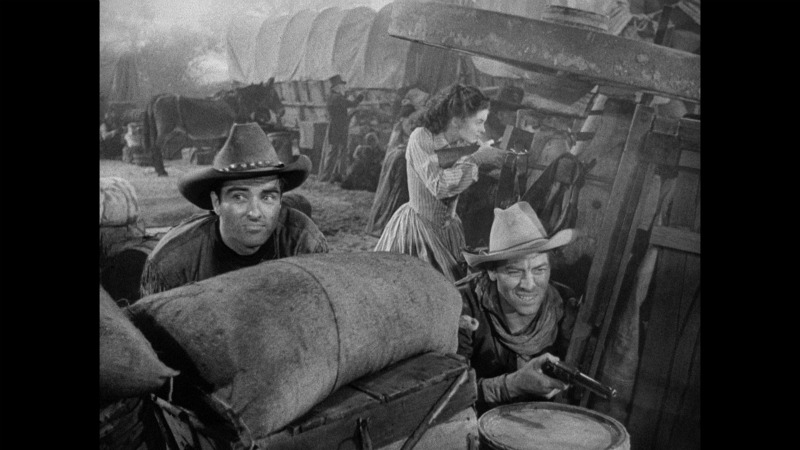
Given the set-up, leading man, and something of the pastoral beauty and rousing songs in the execution, I doubt I was the only one who thought, upon first seeing this, that it wasn’t only quite similar to a John Ford movie, but a better Ford movie than Ford had ever made, at that (an easy thing to say when you’ve only seen two and were too stupid to know what to do with them, in case you were wondering just how much of a jackass I was when I was in college). It’s a hell of a thrilling motion picture, at any rate, driven intensely by a psychological force that places two socio-economic ideologies – workers’ rights versus pure capitalism, essentially – in direct opposition in life-or-death circumstances. Tom does tell the men up front that the trip will be harsh, but if they sign on, they’re in all the way, so is he not entitled to that mission being satisfied? But aren’t the men also entitled to basic rest, food, and, well, not being hung for trying to escape? This is the real Wild West, when not just the elements but the very foundation of society is entirely unpredictable.
Ford famously said of Wayne’s performance in this film, “I didn’t know the son of a bitch could act.” Wayne is indeed in rare form here, letting his screen persona of an easygoing-but-upstanding lug slip a little into an intensely focused vision of what the counter-culture more or less thought him to be – a stand in for an ultra-conservative government out to exploit the common man. But because it’s Wayne, because we feel we know him, we cannot merely fear him. He’s too damn likable, for one. But more persuasively, his position is entirely understandable; it is only the lengths he goes to that alienate us. Early on, Matt remarks that the look in Tom’s eyes, the hunger for money, frightens him, and it cues the audience to notice the same thing, his unwavering determination and nearly soulless resolve.
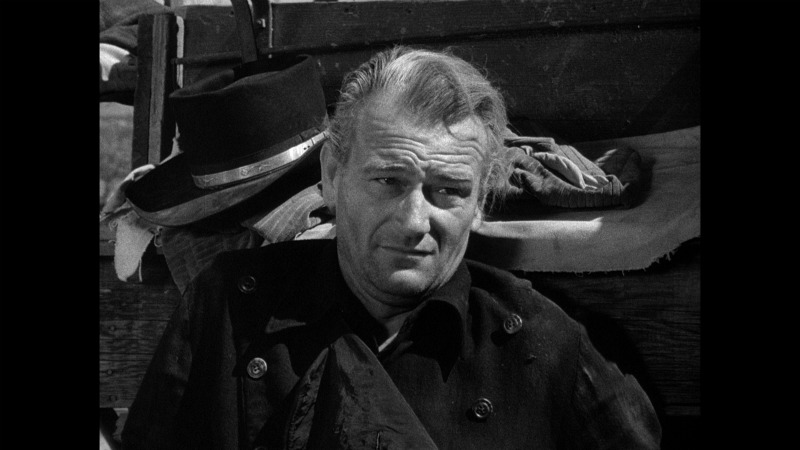
Though perhaps best-known for his more discursive comedies, this sort of extremeness of narrative is not an unfamiliar Hawks trope – people often declare what they want early on and refuse to budge from it (Susan in Bringing Up Baby, Walter in His Girl Friday, Lorelei in Gentlemen Prefer Blondes, Oscar in Twentieth Century). It’s the little detours therein, however, that truly seem to make it Hawksian, and those little bits of silliness (Hawks said that he tried to approach every movie like a comedy) that really come to define the characters and film. It’s the way Walter Brennan stumbles as he tries to barrel past Wayne’s insistent “you’re not going,” or sharpshooter Cherry Valance (John Ireland) trying to tell stories about a girl he bedded once (“She fancied herself a singer…’course she had other–“) before getting interrupted by more immediately concerning, but doubtlessly less amusing concerns.
It’s also the entire character of Tess Millay (Joanna Dru), who has fascinated me endlessly since I first saw the film. I wrote about her for the class in which we watched Red River, and, watching the film again this week, was reminded of just what an odd and wonderful creation she is. On one hand, she’s almost the archetypical classic film woman, all brash and assertive in odd moments; on the other, she’s hopelessly drawn to Matt, a man she hardly knows at all. Sure, it’s easy to write off as 1940s misogyny, and to a certain extent, it is, but the way it’s structured and built into the film is totally odd. When she first meets Matt, they start bickering almost immediately, but when an arrow strikes her shoulder, it’s more Cupid than Native American. Her look changes immediately from curiosity to sexual arousal, and from that moment on, she can hardly take her eyes off of him. Hell, she later offers to have Tom’s children just to get him to stop hunting after Matt, and her final scene in the film, one of those great divisive moments in film history, also demonstrates just how deep and incredible her powers over this film are (all of this is discussed more in the aforementioned essay).
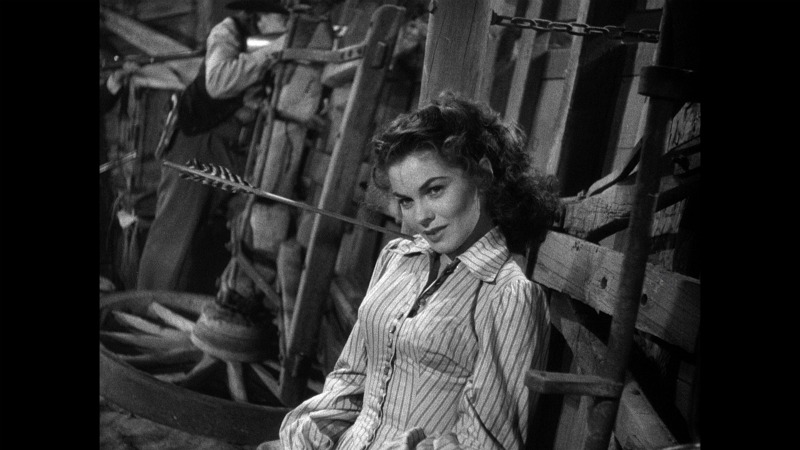
Let’s talk about that ending for a second, for those of you out there who have seen the film. For those who haven’t, well, best you do, then loop on back. I was baffled by it when I first saw it. The entire film builds to this huge showdown between Tom and Matt – Tom marches straight towards him, shoots at him, they ditch their guns, have a rousing fistfight (seriously, Hawks shoots the hell out of it), and then…Tess comes in, tells them to knock it off, and that’s that? Seriously? They shake hands and everything’s good? In the video conversation between critics Dan Sallit and Jaime Christley that’s included on this Masters of Cinema release, they get into that quite a bit, with Sallit saying straight up that he loves the ending purely for how perfectly it reflects Hawks’ attitude towards character, summarizing the whole auteurist mentality beautifully by saying, “I can’t value the dramatic structure of the film more than I value Hawks.”
By chance, I ended up watching Hawks’ 1928 silent film, A Girl in Every Port, earlier this week (and spoiler alert for that, I guess), which features an ending not at all dissimilar from Red River‘s – in both, characters decide they’d be a lot happier being friends than being enemies, with only slightly more motivation lent to the earlier film. Whereas Red River follows two men with a deep bond who become enemies, Girl is about two enemies who find they have more to bond over than fight, so their eventual reconciliation is somewhat more built into the film than that in the Western, but it demonstrates the sort of fraternal feel Hawks must have felt was necessary in life. Or at least in the movies.
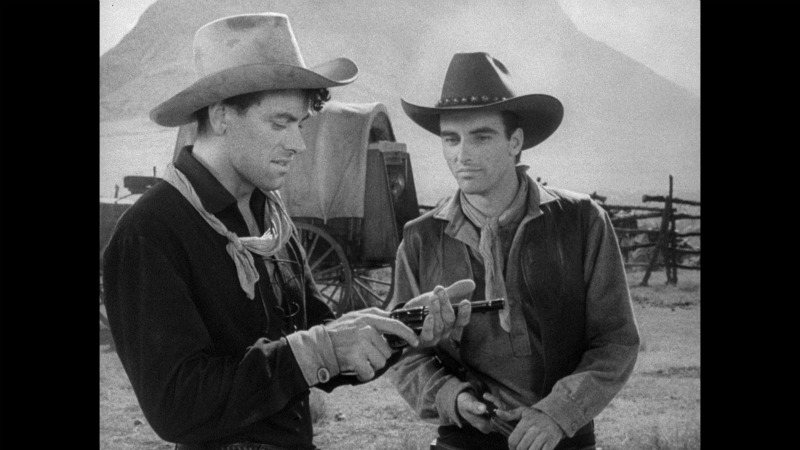
Masters of Cinema brings Red River to Blu-ray (Region-B locked), looking absolutely splendid. I’ve never seen this film in 35mm, but the transfer feels very spot on. The contrast is maybe a little overcranked (you’d have to have a really bright screen to get whites and blacks to bounce like this), but that’s hardly a complaint at all, as it’s the kind of effect I wouldn’t mind the cinema screen having. There are some minor scratches and dirt throughout the film, but hardly anything distracting, and more importantly, no effort appears to have been made to oversharpen or smooth out anything in the picture. It just looks spot on, from the glorious daylight vistas to the really murky night scenes (the scene of Matt watching over the cattle, right before Tess comes to find him, is lovely and spooky and loaded with atmosphere without making a point of any of it). Really outstanding work. The film is presented in its original aspect ratio, 1.37:1.
The special features may be few in number, but, as is usually the case with Masters of Cinema, quite deep. The best of the bunch is the aforementioned conversation with Sallit and Christley, both of whom are avid Hawks fans and offer tremendous insight into his career as a whole, and how Red River fits into it (along with those qualities all its own). So good, I ended up watching it twice, in fact. We also get a Lux Theater Radio adaptation, which isn’t my favorite type of supplement, but offers an interesting perspective on the entertainment industry of the time, particularly since Wayne, Brennan, and Dru are reprising their roles for it.
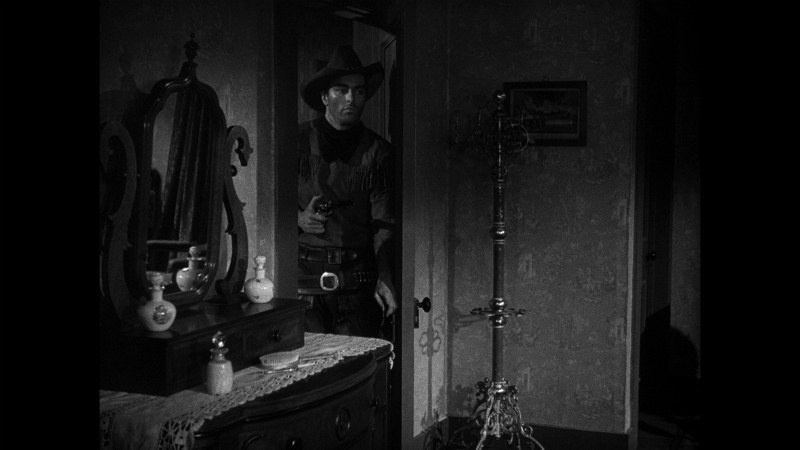
I know I make a huge show about how good MoC’s booklets are in each of these reviews, but you guys…Masters of Cinema puts together really freaking good booklets. Look at what you get here – an excerpt of a lecture by Andrew Sarris, focusing on Howard Hawks; an extract from Suzanne Liandrat-Guigues’ monograph of Red River; an interview with editor Christian Nyby, who cut a handful of Hawks’ films; an interview with screenwriter Borden Chase, who was none too pleased with the way Hawks treated his script, as well as a brief reply from Hawks, who begins by saying “He must have been drinking when he wrote this because he’s so full of shit.” Oh, Hawks. Finally, there’s an essay by Peter Labuza comparing the two versions of the film. The one we have here is the “book” version, using pages to explain the passage of time and so on; elsewhere, a “voice” version exists that employs Brennan to do the same. I’ve never seen the voice version myself, though, judging by Labuza’s description, I’m glad to have sat so long with only the book version.
All in all, this is one of my favorite packages Masters of Cinema put together all year, a great mix of subject and supplements. Red River, like all those great classic auteurist works, continues to fascinate and entertain, and I’m extraordinarily glad to have it at the ready in such good form and with such terrific context provided. If you’re a fan of Hawks at all, this is a no-brainer to own, but I also think it provides a tremendous entry point for the filmmaker and the Western genre as a whole. I certainly wasn’t too keen on them when I first saw it, but it completely opened my mind to one I now consume with tremendous delight. Highly recommended.


